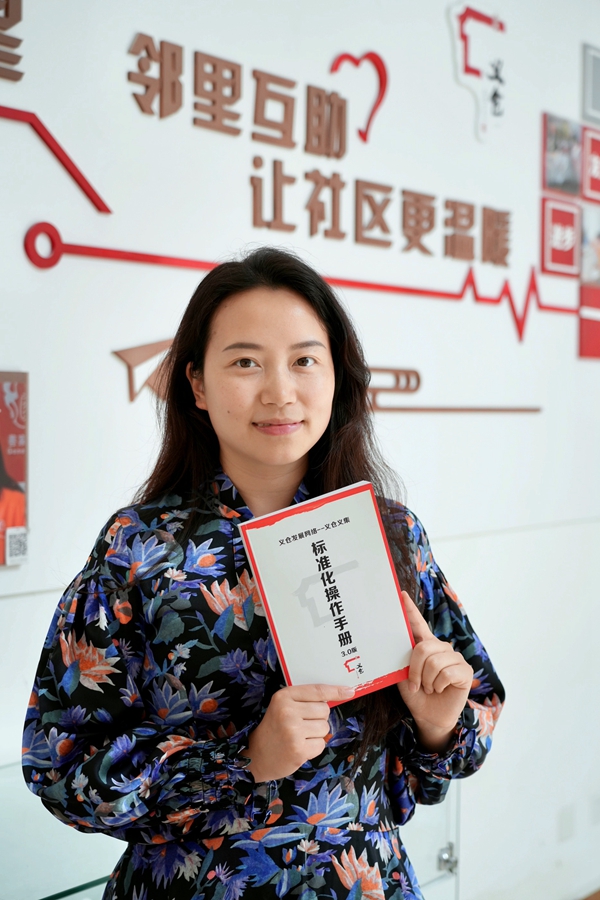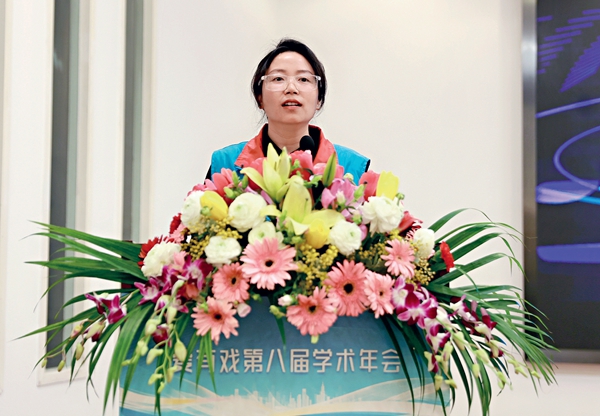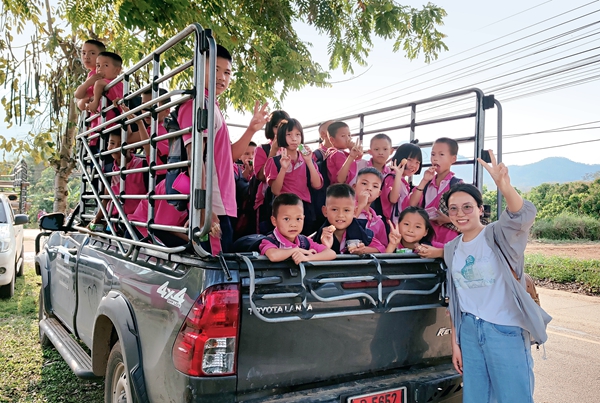Social Worker Warms Residents Through 'A Spoon of Rice'

The experience of being helped after the Wenchuan earthquake (hit Southwest China's Sichuan Province in 2008) shaped the life of Du Cancan, then a senior high school student. At that time, volunteers comforted Du, and they gave her warmth. Since then, she has been passionate about public welfare. Now, Du is deputy director of I You She, a non-profit, community-based social organization. Over the past 10 years, she has dedicated herself to helping residents foster a stronger sense of happiness.
'Modern Charity Granary'
Not knowing one's neighbors has become an all-too-common problem in urban communities in China, even globally. Findings in a survey, released by China Youth Daily several years ago, indicated 80.9 percent of respondents felt their relationships with their neighbors were growing more and more indifferent. Further, 32.4 percent of the respondents only knew their neighbors' names. If in need of help, only 18.5 percent of respondents said they would turn to their neighbors for help.
The survey's findings left some people asking important questions, such as "How can we build trust between neighbors?" "How can we establish a new type of relationship between neighbors, so they will live in harmony and support each other?" Du asked herself similar questions, and she and her team looked for inspiration from traditional Chinese customs. They learned about the concept of the "charity granary."

Chinese have held firm to the tradition of helping the needy and their neighbors since ancient times. "Charity granary," during the Sui (581-618) and Tang dynasties (618-907), was one method used to help people in need. Villagers took some rice, from their homes, to deposit in the village's "charity granary." Children from impoverished families could take rice from the granary to give to their teachers to pay their tuition. When natural disasters happened, the rice in the granary was used to help victims in need of food.
In 2011, Du and her colleagues decided to build modern "charity granaries" in Chengdu (capital of Sichuan Province), and to use the facilities to help establish good relationships among neighbors, and ultimately to create harmonious communities. They organized volunteers to knock on their neighbors' doors, to ask for donations — a spoon per household — of rice. The rice was to be distributed among in-need residents.
"We hope to bring residents together through the 'charity granary,' and to provide them with a platform to express warmth and love," says Du.
Du and her team eventually expanded the functions of the "charity granary," and they began accepting small, non-cash donations from residents. They created four categories of donations: Category A, used materials; Category B, food; Category C, washing products; and, Category D, time (for voluntary services). Charity-minded families can donate a bag of rice, a bucket of cooking oil, a tube of toothpaste, a bag of salt, and/or volunteer for half an hour each month. All donations are numbered, and each donation is recorded online. Families who benefit from the donations through the "charity granary" can become donors by volunteering their time. Everyone can participate in community building in his/her own way.
Given the efforts of Du and her colleagues, the "modern charity granary" has developed into a community mutual-aid project. Over the past decade, the project has been promoted in 105 cities across the country, and more than one million people have gotten involved as volunteers. The initiative has even been promoted in other countries. In 2022, the project was included on the knowledge-sharing online platform of the United Nations Volunteers programme.
Giving Hope to Needy
Du's impression of and passion for social work resulted from an indelible experience in her life. In 2008, Du, then a third-year student at Beichuan High School (in Sichuan's Beichuan Qiang Autonomous County), lived through and witnessed the after-effects of the Wenchuan earthquake. She knew several people who lost their lives in the earthquake. Du was deeply distressed. Countless volunteers, from across the country, rushed to Sichuan, and they raced against time to rescue people from the ruins. They did not worry about their own safety. "Those helping hands gave me warmth and strength … I found the direction in my life," Du recalls.

Du spent almost all of her spare time volunteering for good causes after she entered university, in 2009. For example, she joined the school's youth volunteers association. Under the leadership of outstanding volunteer Liu Fei, Du cofounded a volunteer organization, I You She Public-Benefit Drama Club.
With the help of the Sichuan Provincial Committee of the Communist Youth League of China, the drama club shot a film about left-behind children, whose parents migrated to other places for work. Du spent three months with left-behind children, learning about their lives, and offering services to them. As the days passed, she found that the children became more sensible and cheerful. Therefore, she knew the significance of offering voluntary services to the needy.
Du officially registered I You She in 2011. That act transformed the drama club into a social organization. I You She became one of the first social organizations in Chengdu, and Du became a full-time charity worker.
In 2012, the social organization initiated a charity-based project in an effort to care for elderly people who lived alone, especially those who were needy and/or disabled. Volunteers visited and chatted with the elderly, performed songs and/or dances, and helped the residents with their household chores. The project has since cultivated more than 10 teams of community volunteers, and those teams offer thousands of services to more than 6,500 elderly people.
In November 2022, Du and her team worked with several government departments and public institutions to launch V-Light Plan, a project to cultivate voluntary-service-work staff. "Not only volunteers are needed in the social work sector, professional voluntary-service-work staff — who can plan, organize and study (voluntary services) — are also needed … I attach much importance to the project … It focuses on improving the capacities of voluntary-service-work staff, and promoting the professional and sustainable development of voluntary services," says Du.
The project will last for one year. It will cultivate voluntary-service-work staff (including voluntary-service organizers and administrators) in communities, foundations and social organizations, in several ways, to vitalize volunteer organizations, and to promote standardization and branding of voluntary services.
The organization to date has implemented 264 public-welfare projects, set up 83 work stations in Chengdu, cultivated 15,800 outstanding volunteers, and incubated 734 community-based volunteer organizations. It has organized various community-based activities, for both pre-teens and teenagers, and it has helped the elderly who have a hard time taking care of themselves, children facing difficulties, and minor offenders under community-correctional programs. Its projects have been promoted in 107 cities across the country.
Borderless Love
The organization signed a framework agreement, on the strategic cooperation of public welfare and charity projects, with Sichuan Haihui Poverty Alleviation Service Center and Borderless Friendship Foundation. The signing ceremony was held in Chiang Mai, Thailand, in March 2023. That agreement marks a milestone for I You She in its efforts to participate in volunteer services globally.

Du promoted I You She's brand project, "charity granary," in Chiang Mai. With the help of the center and the foundation, "charity granaries" will benefit some communities and their residents in Chiang Mai.
Parties to the agreement will conduct seminars and studies on various topics, such as the "sustainable development of cities and communities," "building resilient community" and "international voluntary services of social organizations."

Explains Du: "The building of resilient communities is to help communities increase their capabilities of coping with disasters and emergencies, and weathering the storms smoothly. It requires upgrading local facilities, training community staff, developing measures of crisis response, and cultivating local volunteers."
Previously, I You She donated summer clothes to teenagers in a county in Thailand. "It is just a small beginning for Chengdu's social organizations to go abroad and to organize international public-welfare activities. We will become acquainted with more charity-minded people and forces through 'charity granary,' and we will help promote the friendship between Chengdu and Chiang Mai," says Du.
Photos Supplied by Interviewee
(Women of China English Monthly June 2023 issue)
Please understand that womenofchina.cn,a non-profit, information-communication website, cannot reach every writer before using articles and images. For copyright issues, please contact us by emailing: website@womenofchina.cn. The articles published and opinions expressed on this website represent the opinions of writers and are not necessarily shared by womenofchina.cn.








.jpg)

 WeChat
WeChat Weibo
Weibo 京公网安备 11010102004314号
京公网安备 11010102004314号